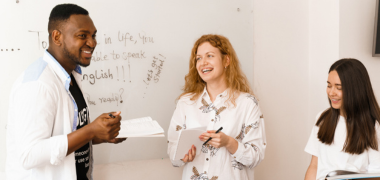
Popular courses in Hobart
Certificate I in EAL (Access)
- There are no mandated entry requirements.
 TasTAFE
TasTAFE
Certificate II in EAL (Access)
- There are no mandated entry requirements.
 TasTAFE
TasTAFE
Bachelor of Education (Primary)
- There are no mandated entry requirements.


Bachelor of Education (Secondary)
- There are no mandated entry requirements.
 Alphacrucis University College
Alphacrucis University College
Diploma of English Language Teaching (TESOL)
- There are no mandated entry requirements.


Certificate IV in English Language Teaching (TESOL)
- There are no mandated entry requirements.


Diploma of Interpreting
- There are no mandated entry requirements.
 Australian Ideal College
Australian Ideal College
Bachelor of Arts (Chinese)
- There are no mandated entry requirements.
 University of Tasmania
University of Tasmania
Bachelor of Arts (Classics)
- There are no mandated entry requirements.
 University of Tasmania
University of Tasmania
Bachelor of Arts (French)
- There are no mandated entry requirements.
 University of Tasmania
University of Tasmania
Bachelor of Arts (German)
- There are no mandated entry requirements.
 University of Tasmania
University of Tasmania
Bachelor of Arts (Indonesian)
- There are no mandated entry requirements.
 University of Tasmania
University of Tasmania
Bachelor of Arts (Japanese)
- There are no mandated entry requirements.
 University of Tasmania
University of Tasmania
Bachelor of Arts (Philosophy)
- There are no mandated entry requirements.
 University of Tasmania
University of Tasmania
Master of Teaching (Secondary)
- There are no mandated entry requirements.





Master of Education (Teaching English to Speakers of Other Languages - TESOL)
- There are no mandated entry requirements.


Doctor of Philosophy
- There are no mandated entry requirements.
 Eva Burrows College
Eva Burrows College
Diploma in Languages
- There are no mandated entry requirements.


Master of Applied Linguistics
- There are no mandated entry requirements.
 University of New England
University of New England
Master of Arts (TESOL)
- There are no mandated entry requirements.
 Bond University
Bond University
Frequently Asked Questions
Yes, there are course providers who offer 20 qualification(s) in Hobart. Find a course provider near you. Once you make an enquiry, a course advisor will get in touch to discuss your study options and course fees.
Written by Courses.com.au Team
There are several campuses within the Hobart area that provide language training. The closest campus is 2km away from the center of Hobart. You can also study a language course through online, traineeship learning. Find a course provider that best suits your needs.
Written by Courses.com.au Team
Potential job roles within language includes english tutor, esl teacher or interpreter translator (to name a few). Browse related occupations to find a career that suits your needs.
Written by Courses.com.au Team
Further reading


A Complete Guide to Certificates II & III in Security Operations
24th February 2025)
